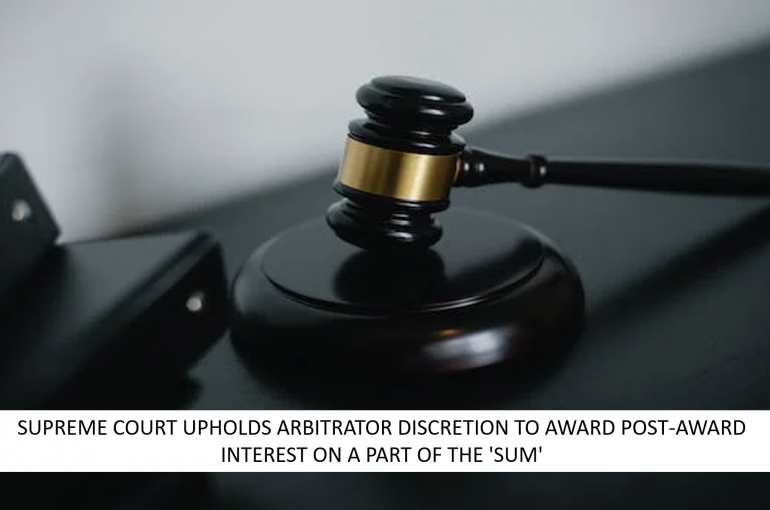SUPREME COURT UPHOLDS ARBITRATOR’S DISCRETION TO AWARD POST-AWARD INTEREST ON A PART OF THE ‘SUM’
Recently, a two Judge Bench of the Supreme Court comprising of Justice DY Chandrachud and Justice AS Bopanna passed a Judgment dated 01.09.2022 in Morgan Securities And Credits Pvt. Ltd. vs Videocon Industries Ltd., in CIVIL APPEAL NO. 5437 OF 2022, and held that the Arbitrator has the discretion to determine the rate of reasonable interest, the sum on which the interest is to be paid, that is whether on the whole or any part of the principal amount, and the period for which payment of interest is to be made – whether it should be for the whole or any part of the period between the date on which the cause of action arose and the date of the award.
FACTS
On 27.01.2003, the Appellant and the Respondent entered into an agreement under which the Respondent availed of bill discounting facilities (Agreement) from the Appellant. The Appellant disbursed Rs. 5,00,32,656/- pursuant to the Agreement. The dues remained unpaid. The Appellant issued a Notice to the Respondent on 10.01.2006 demanding the payment of the principal amount of Rs. 5,00,32,656/- as on 17.04.2003 (date of default) along with overdue interest. Since the Respondent did not pay the amount as demanded, the Appellant issued a Notice of Arbitration on 31.01.2006, invoking the arbitration clause of the Agreement. The sole arbitrator rendered an Arbitral Award in favour of the Appellant on 01.03.2013.
The Arbitrator decreed the claim and awarded an amount of Rs. 5,00,32,656/- along with Interest at the rate as follows
- Twenty one percent per annum from the date of default to the date of the Demand Notice;
- Thirty six percent per annum with monthly rests from the date of the Demand Notice to the date of award (“pre-award interest”); and
- Eighteen percent per annum on the principal amount of Rs. 5,00,32,656/- from the date of Award to the date of payment (“post-award interest”).
The Appellant challenged the Arbitral Award in a petition under Section 34 of the Arbitration and Conciliation Act, 1996 (Act) before the Delhi High Court raising objections on the grant of post-award and pre-award interest. By a judgment dated 07.02.2019, the Single Judge of the Delhi High Court dismissed the petition filed by the Appellant on the grant of post-award interest. The Single Judge held that the Arbitrator had in his discretion restricted the post-award interest to the principal amount and that the court would not interfere with the exercise of discretion
ISSUE
Whether the Arbitrator has the discretion to grant post-award interest only on the principal sum due under Section 31(7)(b) of the Act.
REASONING AND ANALYSIS
Aggrieved by the aforementioned Order of the Delhi High Court, the Appellant moved the Supreme Court under Article 133 of the Constitution of India (Appeals to the Supreme Court in Civil Matters).
The Apex Court in the present case referring to Section 31(7) of the Act, observed that it confers a wide discretion upon the arbitrator in regard to the grant of pre-award interest. The Bench observed that:
“The arbitrator has the discretion to determine the rate of reasonable interest, the sum on which the interest is to be paid, that is whether on the whole or any part of the principal amount, and the period for which payment of interest is to be made – whether it should be for the whole or any part of the period between the date on which the cause of Action arose and the date of the award. When a discretion has been conferred on the arbitrator in regard to the grant of pre-award interest, it would be against the grain of statutory interpretation to presuppose that the legislative intent was to reduce the discretionary power of the arbitrator for the grant of post-award interest under clause (b).”
The Apex Court further observed that the purpose of granting post-award interest is to ensure that the award debtor does not delay the payment of the award. The arbitrator takes note of various factors such as the financial standing of the award-debtor and the circumstances of the parties in dispute before awarding interest. The discretion of the arbitrator can only be restricted by an express provision to that effect. Clause (a) of Section 31(7) of the Act subjects the exercise of discretion by the arbitrator on the grant of pre-award interest in the Arbitral Award. However, there is no provision in the Act which restricts the exercise of discretion to grant post-award interest by the arbitrator. The arbitrator must exercise the discretion in good faith, must take into account relevant and not irrelevant considerations, and must act reasonably and rationally taking cognizance of the surrounding circumstances.
Conclusion
Thus, based on the aforesaid observations, the Apex Court dismissed the Judgement of the Delhi High Court dated 07.02.2019 and held that the phrase ‘unless the award otherwise directs’ in Section 31(7)(b) of the Act only qualifies the rate of interest and according to Section 31(7)(b), if the arbitrator does not grant post-award interest, the award holder is entitled to post-award interest at eighteen percent per annum from the date of the award to the date of payment. The arbitrator must exercise the discretionary power to grant post-award interest reasonably and in good faith, taking into account all relevant circumstances.
Editor’s Comments
The above judgment is in keeping with the Supreme Court’s consistent stand that an Arbitrator is the best judge of his case. The Apex Court has by and large upheld and approved the stand taken by an arbitrator unless the award suffers from reasons set out in Section 34(2) of the Act or is against the public policy. This is possibly to encourage arbitration as an alternate and efficacious remedy for dispute resolution.
Devashish Kakkar
Legal Associate
The Indian Lawyer





































Leave a Reply